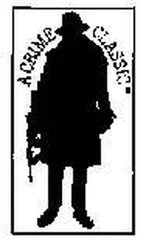In the Saint’s experience, powerful men sought him out either in a blood-lust for revenge or in the hope of somehow employing him towards their own further aggrandisement. Having mentally ruled out the first, he plumped for the second.
“What makes your Mr Patroclos think he can buy me?” he asked casually, and Ariadne’s head swung suddenly around to face him.
“How did you—?”
The hazel eyes had widened.
“It could hardly be anyone else, sweetheart.”
The Saint was conscious of the exaggeration, but he had something of the showman and the conjuror in his make-up, and like any producer of unexpected rabbits he relished the effect upon his audience. Likewise he noted with satisfaction that when he had pronounced the name Patroclos — placing the stress correctly on the first syllable — even Big Spiro had shown visible surprise, and for all the Saint knew he might well have swallowed his dentures.
“Whoever was behind that stunt at the airport more or less had to own the place,” Simon went on. “I’d guess you were on stage for only a few minutes, while I and the other passengers came through. But even that could have been long enough for you to be spotted by someone on the real airport staff.”
“Unless they had been paid not to notice,” Ariadne pointed out reasonably.
“And the customs men? No, this had to be more than ordinary bribery. This Johnny had to have really special influence. And I can’t think of anyone in Greece who’d come anything like as close to that as our Diogenes, bless his puissant heart.”
The girl hesitated for a moment.
“Well, it will do no harm to confirm your guesswork. Mr Patroclos wishes to see you on an important and confidential matter. But I cannot tell you what it is. You’ll meet him soon enough.”
Diogenes Patroclos...
(The first name, which English speakers, for their own peculiar reasons, vocalise as “Dye-odgen-eez”, was pronounced by his compatriots as “Thee-o-yen-ess”, abbreviated by his familiars — by irreverent journalists to “Thee-o”.)
The Saint was already scanning his card-index memory for everything he could remember about the man who was indisputably the wealthiest and most powerful living Greek, a man who controlled a vast and many-tentacled business empire, who was reputed to be among the world’s shrewdest manipulators, and in whom the Saint, for certain reasons, had sometimes been tempted to take a sharpened interest.
He had read somewhere that Patroclos had come of a poor fishing family who had lived a few miles outside the capital. At fourteen, it was said (admittedly mostly by his critics) that he was the leader of a gang of young Athens pickpockets. At seventeen he was a seasoned merchant seaman, and besides piling up a tidy heap of drachmae, which he won in gambling with his shipmates, he had begun to get a grasp of the logistics of the business on which he later founded his fortune. His talent for figure-work and planning was exceptional; and he managed before long to manoeuvre himself into an office job with the same shipping company, and soon began climbing what is known as the management ladder. By the time he was twenty-one and fluent in three foreign languages he had already begun to amass capital by astute investment. At twenty-three or thereabouts, he launched out, so to speak, on his own, with one — battered cargo steamer and an equally battered wharfside office in the Piraeus; and only a few years later he bought out his original employer. In the next twenty years he was in his element — assembling and consolidating a vast complex web of companies, mainly in shipping, air transport, investment, and insurance.
By all accounts Patroclos was a man of immense personal magnetism. His financial touch was a byword among his business contemporaries, and the timing of his acquisitions and divestments was generally regarded as next to uncanny. He was a Midas-figure who pulled strings and then — so it seemed — amused himself by watching the golden marionette-future respond exactly as he had willed.
That was Diogenes Patroclos, as pieced together from the Saint’s mental file of the information scraps he had accumulated on the subject. But colossal and diversified as the Patroclos interests were, his first love, Simon knew, was still shipping. And it was the incidental uses of some of Mr Patroclos’ ships in particular that had begun to arouse the Saint’s speculation.
The Patroclos headquarters occupied one of the more salubriously situated, better camouflaged, and (as Greek estate agents or their counterparts anywhere in the world might have put it) more mature of the office blocks whose incursions Simon had lamented from the air. Which is simply to say that the physical centre of Mr Patroclos’ aforementioned web of businesses was an edifice of manifestly superior quality, decently separated by a protective peripheral cushioning of verdure — including a few decorative citrus groves — from the nearest hubs of lesser commercial universes.
The Rolls disgorged its three passengers at the main entrance, and Ariadne ushered the Saint through the smoked-glass doors, where a plaque of suitably impressive dimensions depicted the chief constellations of the Patroclos cosmos. Big Spiro, his automatic no longer prominently on display, lumbered along behind; and the Saint flashed him a winning smile.
“Does Diogenes keep many other pet performing elephants?” he inquired with genuine interest.
Neither the mammoth nor Ariadne deigned to answer; and the Saint shrugged, and abandoned the attempt at polite conversation.
They proceeded into a large office labelled “D. Patroclos — General Staff” where male and female secretaries were busying themselves with typewriters and telephones. A male secretary got up after a few respectful words into a white telephone and opened the heavy double doors that led to Patroclos’ inner office.
The room was spacious, though smaller than Simon had expected, sumptuously carpeted, and sparsely but superbly furnished in rich heavy browns with splashes of silver and glass here and there.
Patroclos stood up from his desk — a heavy, aggressive-looking man, exuding power like the room itself.
“Sir,” began the girl, “This is Mr—”
“Out,” snapped Patroclos. “I want no calls or interruptions.”
He bundled her out and slammed the doors shut behind her: and the Saint meanwhile calmly installed himself in the mogul’s reclining leather and silver chair, and rested his feet on the elegant walnut desk.
Patroclos turned and eyed the Saint penetratingly, making a lightning appraisal of the debonair ice-cool man who was lounging so insolently before him. And Patroclos saw a lean tanned buccaneer’s face in which the lines of mirth and steel determination somehow coincided; a long relaxed frame that tapered from broad shoulders to the polished shoes that had taken defiant possession of the desk-top; and about the whole person of the Saint an indefinably yet almost tangibly dangerous swashbuckling air. And the Saint stared back at Diogenes Patroclos with ice-blue eyes that had narrowed fractionally as they observed the brusque treatment of Ariadne.
“What the Saint saw was a broad, shortish, almost squat figure, a thickset powerful body, a strong face, black musketballs of eyes under bushy black eyebrows, and still plenty of matching hair atop the somewhat cro-magnon head. Patroclos was wearing a blue serge suit, stiff gleaming linen, and a ring with a diamond in it as big as a cob-nut.
The Saint saw all these things. And then his anger surfaced.
“Dio, old toad,” he began, in a voice thinly edged with silk, “you have made a serious blunder. I am about to give you a graphically detailed rundown on your antecedents, your future prospects of happiness, and a few of the unpleasant experiences which I’ve decided will have to befall you. Besides which I expect to describe — if I can bring myself to look at you — some of the many repellent features of your gross person.”
Читать дальше











